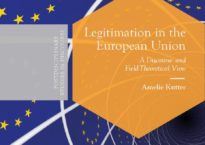
Amelie Kutter is Senior Lecturer and Researcher at the European Studies Unit at European University Viadrina in Frankfurt (Oder).
Europa-Universität Viadrina
Große Scharrnstr. 59, 15230 Frankfurt (Oder), room LH 110, +49 335 5534 254
Email
Office hour: Tuesdays 2-3:30pm, face-to-face, online or on the phone, please register here for a slot: https://nuudel.digitalcourage.de/lB33oQ2l1gg5Jpqu 
Amelie Kutter is Senior Lecturer and Researcher at the European Studies Unit at European University Viadrina in Frankfurt (Oder).
Europa-Universität Viadrina
Große Scharrnstr. 59, 15230 Frankfurt (Oder), room LH 110, +49 335 5534 254
Email
Office hour: Tuesdays 2-3:30pm, face-to-face, online or on the phone, please register here for a slot: https://nuudel.digitalcourage.de/lB33oQ2l1gg5Jpqu[en:]
Amelie Kutter is Senior Lecturer and Researcher at the European Studies Unit at European University Viadrina in Frankfurt (Oder).
Europa-Universität Viadrina
Große Scharrnstr. 59, 15230 Frankfurt (Oder), room LH 110, +49 335 5534 254
Email
Office hour: Tuesdays 2-3:30pm, face-to-face, online or on the phone, please register here for a slot: https://nuudel.digitalcourage.de/lB33oQ2l1gg5Jpqu
Amelie Kutter is Senior Lecturer and Researcher at the European Studies Unit at European University Viadrina in Frankfurt (Oder).
Europa-Universität Viadrina
Große Scharrnstr. 59, 15230 Frankfurt (Oder), room LH 110, +49 335 5534 254
Email
Office hour: Tuesdays 2-3:30pm, face-to-face, online or on the phone, please register here for a slot: https://nuudel.digitalcourage.de/lB33oQ2l1gg5Jpqu[en:]
Amelie Kutter is Senior Lecturer and Researcher at the European Studies Unit at European University Viadrina in Frankfurt (Oder).
Europa-Universität Viadrina
Große Scharrnstr. 59, 15230 Frankfurt (Oder), room LH 110, +49 335 5534 254
Email
Office hour: Tuesdays 2-3:30pm, face-to-face, online or on the phone, please register here for a slot: https://nuudel.digitalcourage.de/lB33oQ2l1gg5Jpqu[en:].
Amelie Kutter is Senior Lecturer and Researcher at the European Studies Unit at European University Viadrina in Frankfurt (Oder).
Europa-Universität Viadrina
Große Scharrnstr. 59, 15230 Frankfurt (Oder), room LH 110, +49 335 5534 254
Email
Office hour: Tuesdays 2-3:30pm, face-to-face, online or on the phone, please register here for a slot: https://nuudel.digitalcourage.de/lB33oQ2l1gg5Jpqu 
Amelie Kutter is Senior Lecturer and Researcher at the European Studies Unit at European University Viadrina in Frankfurt (Oder).
Europa-Universität Viadrina
Große Scharrnstr. 59, 15230 Frankfurt (Oder), room LH 110, +49 335 5534 254
Email
Office hour: Tuesdays 2-3:30pm, face-to-face, online or on the phone, please register here for a slot: https://nuudel.digitalcourage.de/lB33oQ2l1gg5Jpqu[en:]
Amelie Kutter is Senior Lecturer and Researcher at the European Studies Unit at European University Viadrina in Frankfurt (Oder).
Europa-Universität Viadrina
Große Scharrnstr. 59, 15230 Frankfurt (Oder), room LH 110, +49 335 5534 254
Email
Office hour: Tuesdays 2-3:30pm, face-to-face, online or on the phone, please register here for a slot: https://nuudel.digitalcourage.de/lB33oQ2l1gg5Jpqu
Amelie Kutter is Senior Lecturer and Researcher at the European Studies Unit at European University Viadrina in Frankfurt (Oder).
Europa-Universität Viadrina
Große Scharrnstr. 59, 15230 Frankfurt (Oder), room LH 110, +49 335 5534 254
Email
Office hour: Tuesdays 2-3:30pm, face-to-face, online or on the phone, please register here for a slot: https://nuudel.digitalcourage.de/lB33oQ2l1gg5Jpqu[en:]
Amelie Kutter is Senior Lecturer and Researcher at the European Studies Unit at European University Viadrina in Frankfurt (Oder).
Europa-Universität Viadrina
Große Scharrnstr. 59, 15230 Frankfurt (Oder), room LH 110, +49 335 5534 254
Email
Office hour: Tuesdays 2-3:30pm, face-to-face, online or on the phone, please register here for a slot: https://nuudel.digitalcourage.de/lB33oQ2l1gg5Jpqu[en:]
Amelie Kutter is Senior Lecturer and Researcher at the European Studies Unit at European University Viadrina in Frankfurt (Oder).
Europa-Universität Viadrina
Große Scharrnstr. 59, 15230 Frankfurt (Oder), room LH 110, +49 335 5534 254
Email
Office hour: Tuesdays 2-3:30pm, face-to-face, online or on the phone, please register here for a slot: https://nuudel.digitalcourage.de/lB33oQ2l1gg5Jpqu
Amelie Kutter is Senior Lecturer and Researcher at the European Studies Unit at European University Viadrina in Frankfurt (Oder).
Europa-Universität Viadrina
Große Scharrnstr. 59, 15230 Frankfurt (Oder), room LH 110, +49 335 5534 254
Email
Office hour: Tuesdays 3-4pm, upon appointment, face-to-face, online or on the phone.
Amelie Kutter is Senior Lecturer and Researcher at the European Studies Unit at European University Viadrina in Frankfurt (Oder).
Europa-Universität Viadrina
Große Scharrnstr. 59, 15230 Frankfurt (Oder), room LH 110
Email
Office hour: Tuesdays 3am-4pm, upon appointment, face-to-face, online or on the phone.
Amelie Kutter is Senior Lecturer and Researcher at the European Studies Unit at European University Viadrina in Frankfurt (Oder).
Europa-Universität Viadrina
Große Scharrnstr. 59, 15230 Frankfurt (Oder), room LH 110, +49 335 5534 254
Email
Office hour: Tuesdays 3am-4pm, upon appointment, face-to-face, online or on the phone.
Amelie Kutter is Senior Lecturer and Researcher at the European Studies Unit at European University Viadrina in Frankfurt (Oder).
Europa-Universität Viadrina
Große Scharrnstr. 59, 15230 Frankfurt (Oder), room LH 110
Email
Office hour: Tuesdays 3am-4pm, upon appointment, face-to-face, online or on the phone.

